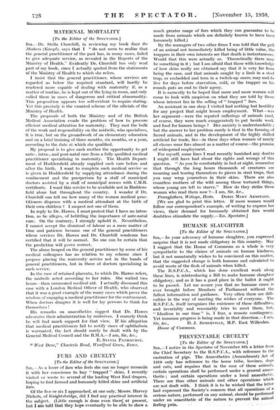MATERNAL MORTALITY
[To the Editor of the SPECTATOR.] Sin.—Dr. Stella Churchill, in reviewing my book Save the Mothers (Knopf), says that I " do not seem to realize that the general practitioner of the past has, in many cases, failed to give adequate service, as revealed in the Reports of the Ministry of Health." Evidently Dr. Churchill has only read part of my book, since I actually quoted from the statements of the Ministry of Health to which she refers.
I insist that the general practitioner, whose services are regarded as below the required standard, will hardly be rendered more capable of dealing with maternity if, as a matter of routine, he is kept out of the lying-in room, and only- called there in cases of dangerous and critical abnormality. This proposition appears too self-evident to require stating. Yet this precisely is the vaunted scheme of the officials of the Ministry of Health.
The proposals of both the Ministry and of the British Medical Association evade the problem of how to procure efficient medical attention for maternity. They cast the bulk of the work and responsibility on the midwife, who specializes, it is true, but on the groundwork of an elementary education and on a brief training of three months, six months, or a year, according to the date at which she qualified.
My proposal is to give each mother the opportunity to get ante-, intro-, and post-natal care from a fully qualified medical practitioner specialising in maternity. The Health Depart- ment of Huddersfield already supplied such care before and after the birth. I want to complete such medical service as is given in Huddersfield by supplying attendance during the confinement and the puerperium by a staff of municipal doctors assisted by a staff of municipal nurses with C.M.B. certificate. I want this service to be available not in Hudders- field alone but throughout the country. I wonder if Dr. Churchill can tell me how many of the women medical prac- titioners dispense with a medical attendant at the birth of their own children ? I suspect not one of them.
In reply to Dr. Hawes, I must protest that I have no inten- tion, as he alleges, of belittling the importance of ante-natal care. On the contrary, I strongly uphold it. Nevertheless, I cannot accept the dismissal of labour as a mere matter of time and patience because one of the general practitioners whose services Dr. Hawes and Dr. Churchill condemn has certified that it will be normal. No one can be certain that the prediction will prove correct.
The abuse heaped on the general practitioner by some of his medical colleagues has no relation to my scheme since I propose placing the maternity service not in the hands of general practitioners, but in those of doctors specializing in such service.
In the case of retained placenta, to which Dr. Hawes refers, the midwife acted according to her rules. She waited two hours—then summoned medical aid. I actually discussed this case with a London Medical Officer of Health, who observed that it was a good example of the many cases which prove the wisdom of engaging a medical practitioner for the confinement. When doctors disagree it is well for lay persons to think for themselves !
His remarks on anaesthetics suggest that Dr. Hawes advocates their administration by midwives. I scarcely think he will find much support for that view. If his allegation that medical practitioners fail to notify cases of ophthalmia is warranted, the fact should surely be dealt with by the Genial Medical Council and the B.M.A.—I am, Sir, &c.,
E. SYLVIA PANKIIURST. West Dcne," Charteris Road, Woodford Green, Esser.








































 Previous page
Previous page